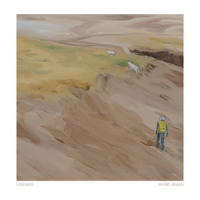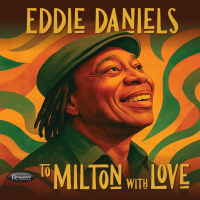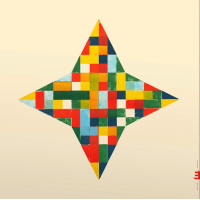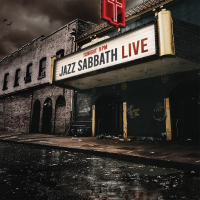Home » Jazz Articles » Multiple Reviews » Yosef Gutman Levitt's Joy in Collaboration
Yosef Gutman Levitt's Joy in Collaboration
 Yosef Gutman Levitt and Peter Broderick
Yosef Gutman Levitt and Peter BroderickRiver of Eden
Soul Song Records
2024
As his titles often show, Levitt is a player that aims for the pure and heartfelt, from a lovely resonant bass tone to melodies familiar enough to be downright cozy. Many themes here are the plain but universal sort; the likes of "Gratitude," "Renewal" and "Resilience" are meditations as much as songs, drifting through plain and evocative motifs with the grace of a butterfly. Levitt and Peter Broderick make it a meeting of minds as much as musical voices. Both contribute original pieces and ideas. Some others are cribbed from traditional melodies old as the hills, some emerge from gently wafting improvisations and all feed into the same sound—the feel of tapping into something deep and timeless.
Broderick's personality makes a foil as important and heartfelt as the sound of his violin. Keen ears may spot him looping or processing its sound here or there, but lightly enough that it never disturbs the spontaneous feel of the group recording together in the room. The friends at hand contribute guitar, piano and cello in the same simpatico fashion, nobody standing out, everyone letting each idea unwind as it will. Whether the listener believes in the mythical Eden or not, anyone with patience can hear how this River evokes the beauty of the natural world and looks beyond for something more heavenly as well.
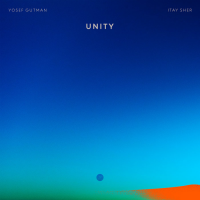 Yosef Gutman Levitt and Itay Sher
Yosef Gutman Levitt and Itay SherUnity
Soul Song Records
2024
The pieces here are again built around melodies simple and direct, while Levitt and guitarist Itay Sher weave them in sparse arrangements over a shifting bed of light strings and reeds. In a change from Levitt's usual recording M.O. of capturing something in a few days, Unity was grown patiently over months. The session is mostly based around various Hasidic nigunim (devotional songs), which traditionally exist as single-line melodies with no set chords or frameworks. The pair kept regularly revisiting the pieces and gradually molding them into their own set of variations, picking up each one like a well-worn stone and thoughtfully turning it over to see how different angles might catch the light.
A trio of nigunim appear in two variations each, and considering their origin, one can still discern their 'proper' meanings—the longing trance of "Nigun Ga'aguim" as it floats quietly or builds to a rhythmic peak, or the communion song "Tsama Lecha Nafshi" in versions both breezy and slow-growing. At the same time, Levitt and Sher enjoy the chance to drape them in new chamber-jazz clothes. Sher's own "Rain Melody" feels old-worldly enough to fit with the genuinely old songs, while his other original "The Way Back Home" channels a bit of Pat Metheny at his most folky. The session may feel light in some senses (under half an hour and often practically diaphanous), yet carries the weight of life and experience with warmth and charm.
 Yosef Gutman Levitt and Gilad Hekselman
Yosef Gutman Levitt and Gilad HekselmanWhy Ten?
Soul Song Records
2024
This titular theme is one of symbolism—musing on ideas central to some human beliefs and thoughts—which again is simply another means toward connection and communion. The featured co-lead here is Gilad Hekselman, whose fleet guitar adds a dash of electric juice while disturbing the out-of-time nature vibe not at all. He eases into "Rushing Rapids" in a haze of backward-sounding distortion that feels like a spray of bubbles, then spends most of the program complementing Levitt's warm intensity with a mix of liquid lines and soft clouds.
The close-knit quartet spins all these daydreams with comfortable ease, taking a pure joy in playing and conversing and trusting the process to let things happen. The pieces are largely nature-themed, often simple motifs evoking scenes of farms or deserts with a subtle intensity (give or take a brief dip into funk). The floating 10-note line of the title track almost feels like another old hymn full of mystery. "Sha'lu Shalom Yerushalayim" (a traditional peace song also on the Unity roster) gets an outing here as quasi-formless guitar meditation over slow-rolling cymbals. The mutual generosity is a soothing tonic for worrying times; the players know how to imbue the simplest parts with feeling and care (in all senses of the word).
Tracks and Personnel
River of EdenTracks: The Open Door; Nigun Al Achat; Gratitude; Nigun Ana Avda; Revolution; Resilience; Nigun Eshet Chayil (Woman of Valor); Cinnamon Swirl; The Old City; Renewal; Reflection; Wave of Forgiveness.
Personnel: Yosef Gutman Levitt: double bass, five-string acoustic bass; Peter Broderick: violin/effects; Yonathan Avishai: piano; Itay Sher: nylon-string guitar; Yoed Nir: cello.
Unity
Tracks: Tsama Lecha Nafshi I; Tsama Lecha Nafshi II; Kremenchoger I; Nigun Ga'aguim I; Nigun Ga'aguim II; Rain Melody; The Way Back Home; Sha'alu Shalom Yerushalayim; Kremenchoger II.
Personnel: Itay Sher: nylon-string guitar; Yosef Gutman Levitt: double bass, five-string acoustic bass; Gilad Ronen: reeds, arrangements.
Why Ten?
Tracks: Rushing Rapid; Why Ten?; Nigun 551; B'Nei Heichala; Desert Days; From Darkness to Light; From the Water; Arava Route 90; Soul Spark; Neria's Farm; Two Souls; Walking in Simplicity.
Personnel: Gilad Hekselman: electric and acoustic guitars; Yosef Gutman Levitt: double bass, acoustic bass guitar; Gilad Ronen: reeds; Ofri Nehemya: drums.
Tags
Multiple Reviews
Yosef Gutman Levitt
Geno Thackara
Soul Song Records
Peter Broderick
Itay Sher
pat metheny
Gilad Hekselman
PREVIOUS / NEXT
Support All About Jazz
 All About Jazz has been a pillar of jazz since 1995, championing it as an art form and, more importantly, supporting the musicians who make it. Our enduring commitment has made "AAJ" one of the most culturally important websites of its kind, read by hundreds of thousands of fans, musicians and industry figures every month.
All About Jazz has been a pillar of jazz since 1995, championing it as an art form and, more importantly, supporting the musicians who make it. Our enduring commitment has made "AAJ" one of the most culturally important websites of its kind, read by hundreds of thousands of fans, musicians and industry figures every month.








